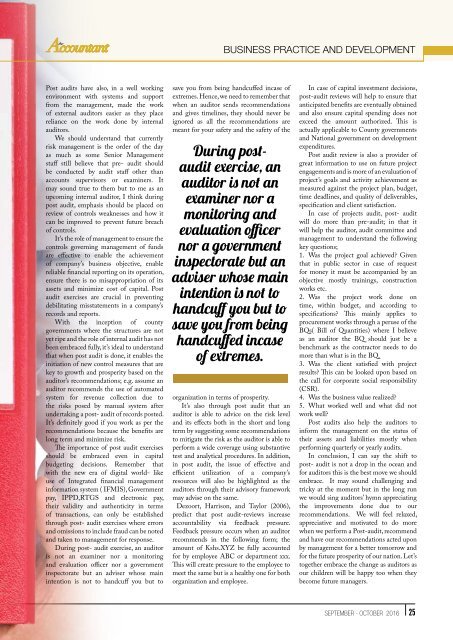The Accountant Sep-Oct 2016√(2)
You also want an ePaper? Increase the reach of your titles
YUMPU automatically turns print PDFs into web optimized ePapers that Google loves.
BUSINESS Practice and development<br />
Post audits have also, in a well working<br />
environment with systems and support<br />
from the management, made the work<br />
of external auditors easier as they place<br />
reliance on the work done by internal<br />
auditors.<br />
We should understand that currently<br />
risk management is the order of the day<br />
as much as some Senior Management<br />
staff still believe that pre- audit should<br />
be conducted by audit staff other than<br />
accounts supervisors or examiners. It<br />
may sound true to them but to me as an<br />
upcoming internal auditor, I think during<br />
post audit, emphasis should be placed on<br />
review of controls weaknesses and how it<br />
can be improved to prevent future breach<br />
of controls.<br />
It’s the role of management to ensure the<br />
controls governing management of funds<br />
are effective to enable the achievement<br />
of company’s business objective, enable<br />
reliable financial reporting on its operation,<br />
ensure there is no misappropriation of its<br />
assets and minimize cost of capital. Post<br />
audit exercises are crucial in preventing<br />
debilitating misstatements in a company’s<br />
records and reports.<br />
With the inception of county<br />
governments where the structures are not<br />
yet ripe and the role of internal audit has not<br />
been embraced fully, it’s ideal to understand<br />
that when post audit is done, it enables the<br />
initiation of new control measures that are<br />
key to growth and prosperity based on the<br />
auditor’s recommendations; e.g. assume an<br />
auditor recommends the use of automated<br />
system for revenue collection due to<br />
the risks posed by manual system after<br />
undertaking a post- audit of records posted.<br />
It’s definitely good if you work as per the<br />
recommendations because the benefits are<br />
long term and minimize risk.<br />
<strong>The</strong> importance of post audit exercises<br />
should be embraced even in capital<br />
budgeting decisions. Remember that<br />
with the new era of digital world- like<br />
use of Integrated financial management<br />
information system ( IFMIS), Government<br />
pay, IPPD,RTGS and electronic pay,<br />
their validity and authenticity in terms<br />
of transactions, can only be established<br />
through post- audit exercises where errors<br />
and omissions to include fraud can be noted<br />
and taken to management for response.<br />
During post- audit exercise, an auditor<br />
is not an examiner nor a monitoring<br />
and evaluation officer nor a government<br />
inspectorate but an adviser whose main<br />
intention is not to handcuff you but to<br />
save you from being handcuffed incase of<br />
extremes. Hence, we need to remember that<br />
when an auditor sends recommendations<br />
and gives timelines, they should never be<br />
ignored as all the recommendations are<br />
meant for your safety and the safety of the<br />
During postaudit<br />
exercise, an<br />
auditor is not an<br />
examiner nor a<br />
monitoring and<br />
evaluation officer<br />
nor a government<br />
inspectorate but an<br />
adviser whose main<br />
intention is not to<br />
handcuff you but to<br />
save you from being<br />
handcuffed incase<br />
of extremes.<br />
organization in terms of prosperity.<br />
It’s also through post audit that an<br />
auditor is able to advice on the risk level<br />
and its effects both in the short and long<br />
term by suggesting some recommendations<br />
to mitigate the risk as the auditor is able to<br />
perform a wide coverage using substantive<br />
test and analytical procedures. In addition,<br />
in post audit, the issue of effective and<br />
efficient utilization of a company’s<br />
resources will also be highlighted as the<br />
auditors through their advisory framework<br />
may advise on the same.<br />
Dezoort, Harrison, and Taylor (2006),<br />
predict that post audit-reviews increase<br />
accountability via feedback pressure.<br />
Feedback pressure occurs when an auditor<br />
recommends in the following form; the<br />
amount of Kshs.XYZ be fully accounted<br />
for by employee ABC or department xxx.<br />
This will create pressure to the employee to<br />
meet the same but is a healthy one for both<br />
organization and employee.<br />
In case of capital investment decisions,<br />
post-audit reviews will help to ensure that<br />
anticipated benefits are eventually obtained<br />
and also ensure capital spending does not<br />
exceed the amount authorized. This is<br />
actually applicable to County governments<br />
and National government on development<br />
expenditures.<br />
Post audit review is also a provider of<br />
great information to use on future project<br />
engagements and is more of an evaluation of<br />
project’s goals and activity achievement as<br />
measured against the project plan, budget,<br />
time deadlines, and quality of deliverables,<br />
specification and client satisfaction.<br />
In case of projects audit, post- audit<br />
will do more than pre-audit; in that it<br />
will help the auditor, audit committee and<br />
management to understand the following<br />
key questions;<br />
1. Was the project goal achieved? Given<br />
that in public sector in case of request<br />
for money it must be accompanied by an<br />
objective mostly trainings, construction<br />
works etc.<br />
2. Was the project work done on<br />
time, within budget, and according to<br />
specifications? This mainly applies to<br />
procurement works through a peruse of the<br />
BQs( Bill of Quantities) where I believe<br />
as an auditor the BQ should just be a<br />
benchmark as the contractor needs to do<br />
more than what is in the BQ.<br />
3. Was the client satisfied with project<br />
results? This can be looked upon based on<br />
the call for corporate social responsibility<br />
(CSR).<br />
4. Was the business value realized?<br />
5. What worked well and what did not<br />
work well?<br />
Post audits also help the auditors to<br />
inform the management on the status of<br />
their assets and liabilities mostly when<br />
performing quarterly or yearly audits.<br />
In conclusion, I can say the shift to<br />
post- audit is not a drop in the ocean and<br />
for auditors this is the best move we should<br />
embrace. It may sound challenging and<br />
tricky at the moment but in the long run<br />
we would sing auditors’ hymn appreciating<br />
the improvements done due to our<br />
recommendations. We will feel relaxed,<br />
appreciative and motivated to do more<br />
when we perform a Post-audit, recommend<br />
and have our recommendations acted upon<br />
by management for a better tomorrow and<br />
for the future prosperity of our nation. Let’s<br />
together embrace the change as auditors as<br />
our children will be happy too when they<br />
become future managers.<br />
SEPTEMBER - OCTOBER 2016 25



